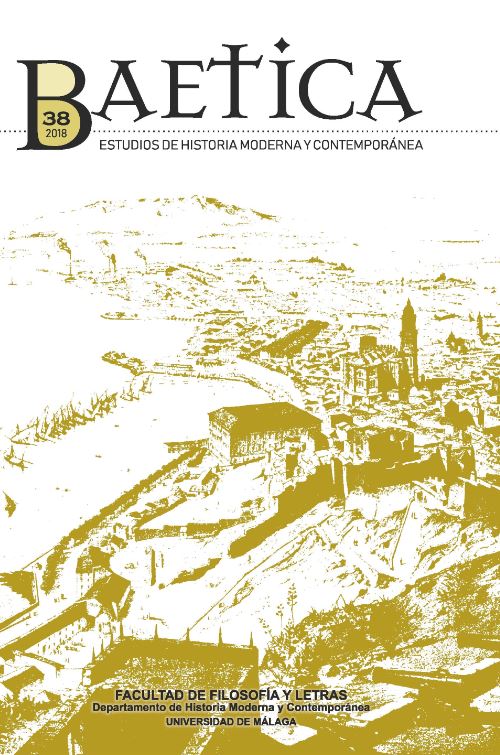The Monarchy of Philip V and his ties with the France of the Regency: the case of the Cellamare Conspiracy
DOI:
https://doi.org/10.24310/BAETICA.2018.v0i38.5511Keywords:
Cellamare, Versailles, Conspiration, Ballance of Power, War of the Quadruple AllianceAbstract
At the end of 1718, a short war began that directly affected the claims of Felipe V and his court. While in the war of the Spanish Succession, France and Spain formed one side, four years later they were in opposite positions. One of the highlights of this distance is the one that occupies this work; the conspiracy of Cellamare or the umpteenth attempt of Spanish political interference in the court of Versailles. An episode that is useful to understand the same context and the development of Franco-Spanish relations.Downloads
Metrics
References
ALBAREDA SALVADÓ, Joaquim (2007), “Proyectos políticos enfrentados en la “guerra más que civil” de 1705 a 1714”, en A. ÁLVAREZ-OSSORIO, B.J. GARCÍA GARCÍA y V. LEÓN SANZ (eds.), La pérdida de Europa. La guerra de Sucesión por la Monarquía de España, Fundación Carlos de Amberes, Madrid, pp. 271-292.
ANDERSON, Matthew Smith (2014), The War of Austrian Succession, 1740-1748, Routledge, Londres-Nueva York.
APARICIO VALERO, Maria Gloria (2013), Regalismo borbónico e historia crítica, Institució Alfons el Magnànim, Valencia.
BAUDRILLART, Alfred (2001), Felipe V y la corte de Francia, vol. 1, Universidad de Murcia, Murcia.
BÉLY, Lucien (2013), “Les négotiations franco-espagnoles pendant
la Guerre de Succession d’Espagne”, Cuadernos de Historia Moderna, 12, pp. 61-76.
BÉLY, Lucien (2007), L’art de la paix en Europe. Naissance de la diplomatie moderne XVIe-XVIIIe siècle, Presses Universitaires de France, París.
BERNARDO ARES, José Manuel de (2009), “Los embajadores franceses en España: Primeros ministros de la Monarquía Hispánica (1701-1709)”, en R. PORRES y I. REGUERA, La proyección de la Monarquía Hispánica en Europa. Política, Guerra y Diplomacia entre los siglos XVI y XVIII, Universidad del País Vasco, Bilbao, pp. 121-146.
BERNARDO ARES, José Manuel, ECHEVERRÍA PEREDA, Elena y ORTEGA ARJONILLA, Emilio (2011), De Madrid a Versalles. La correspondencia bilingüe entre el rey Sol y Felipe V durante la Guerra de Sucesión, Ariel, Barcelona.
BOURGEOIS, Émile (1909), La diplomatie secrète au XVIIIe siècle:
ses débuts, I. Le secrete du régent et la poltique de l’abbé Dubois (Triple et Quadruple Alliances) (1716-1718), Libraire Armand Colin, París.
EGIDO, Teófanes (1979), “El regalismo y las relaciones Iglesia-Estado en el siglo XVIII”, en R. GARCÍA-VILLOSLADA (ed.), Historia de la Iglesia en España, Biblioteca de Autores Cristianos, Madrid, pp. 125-254.
GIMÉNEZ LÓPEZ, Enrique (2005), “Conflicto armado con Francia y la guerrilla austracista en Cataluña (1719-1720)”, Hispania, 65-220, pp. 543-600
LÓPEZ-CORDÓN CORTEZO, Maria Victoria (2003), “Pacte de familleo ou intérêts d’État? La monarchie française et la diplomatie espagnole du XVIIIe siècle”, en L. BÉLY, La présence des Bourbons en Europe, XVIe-XXIe siècle, Presses Universitaires de France, París, pp. 185-205.
MARTÍNEZ SHAW, Carlos y ALFONSO MOLA, Marina (2001), Felipe V, Arlanza ediciones, Madrid.
SALLÉS VILASECA, Núria (2015), “La política exterior de Felipe V entre 1713 y 1719: un desafío al sistema de Utrecht”, en J. ALBAREDA SALVADÓ, (ed.), El declive de la Monarquía Hispánica y del Imperio Español. Los tratados de Utrecht (1713-14), Crítica, Barcelona, pp. 277-317.
SALLÉS VILASECA, Núria (2016), “Que nos odien, si también nos temen”. El razonamiento estratégico detrás de las campañas de Cerdeña y Sicilia (1717-1718)», Vegueta, 16, pp. 313-334.
SAINT-SIMON, Louis de Rouvroy, duque de (2008), en M.A. PÉREZ SAMPER y J. LORENZO MIRALLES, Saint-Simon en España. Memorias: junio de 1721-abril de 1722, Universidad de Alicante, Alicante, 2008.
OZANAM, Didier (2002), “Los embajadores españoles en Francia durante el reinado de Felipe V»” en J.L. PEREIRA IGLESIAS (ed.), Felipe V de Borbón (1701-1746). Actas del Congreso de San Fernando (Cádiz), de 27 de noviembre a 1 de diciembre de 2000, Universidad de Córdoba, Córdoba.
Downloads
Published
How to Cite
Issue
Section
License
This journal provides immediate free access to its content on the principle of making research freely available to the public. All content published in Baetica. Modern and Contemporary History Studies are subject to the Creative Commons Acknowledgment-NoCommercial-ShareAlike 4.0 license, the full text of which can be found at <http://creativecommons.org/licenses/by-nc-sa/4.0>
They may be copied, used, disseminated, transmitted and publicly displayed, provided that:
The authorship and the original source of its publication (magazine, publisher and URL of the work) must be cited.
They are not used for commercial purposes.
The existence and specifications of this use license are mentioned.
Copyrights are of two kinds: moral and patrimonial. Moral rights are perpetual, inalienable, non-transferable, inalienable, unattachable and imprescriptible prerogatives. In accordance with copyright legislation, BAETICA. Estudios de Historia Moderna y Contemporánea recognizes and respects the moral right of the authors, as well as the ownership of the patrimonial right, which will be transferred to the University of Malaga for its open access dissemination. Economic rights refer to the benefits obtained from the use or disclosure of works. BAETICS. Estudios de Historia Moderna y Contemporánea is published in open access and is exclusively authorized to carry out or authorize by any means the use, distribution, disclosure, reproduction, adaptation, translation or transformation of the work.
It is the responsibility of the authors to obtain the necessary permissions of the images that are subject to copyright.
Authors whose contributions are accepted for publication in this journal will retain the non-exclusive right to use their contributions for academic, research, and educational purposes, including self-archiving or deposit in open access repositories of any kind.
The electronic edition of this magazine is edited by the Editorial of the University of Malaga (UmaEditorial), being necessary to cite the source in any partial or total reproduction.







2.png)
